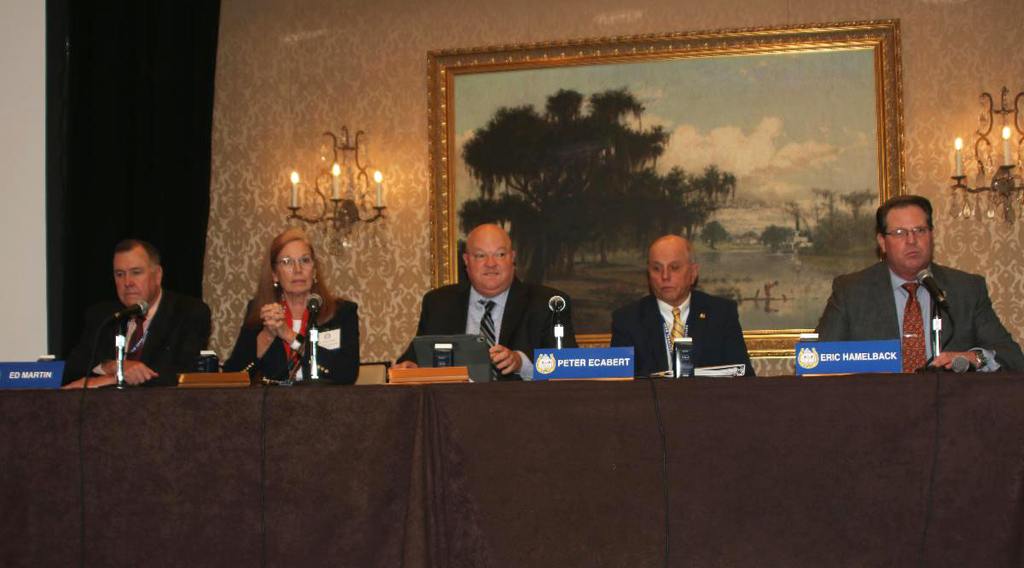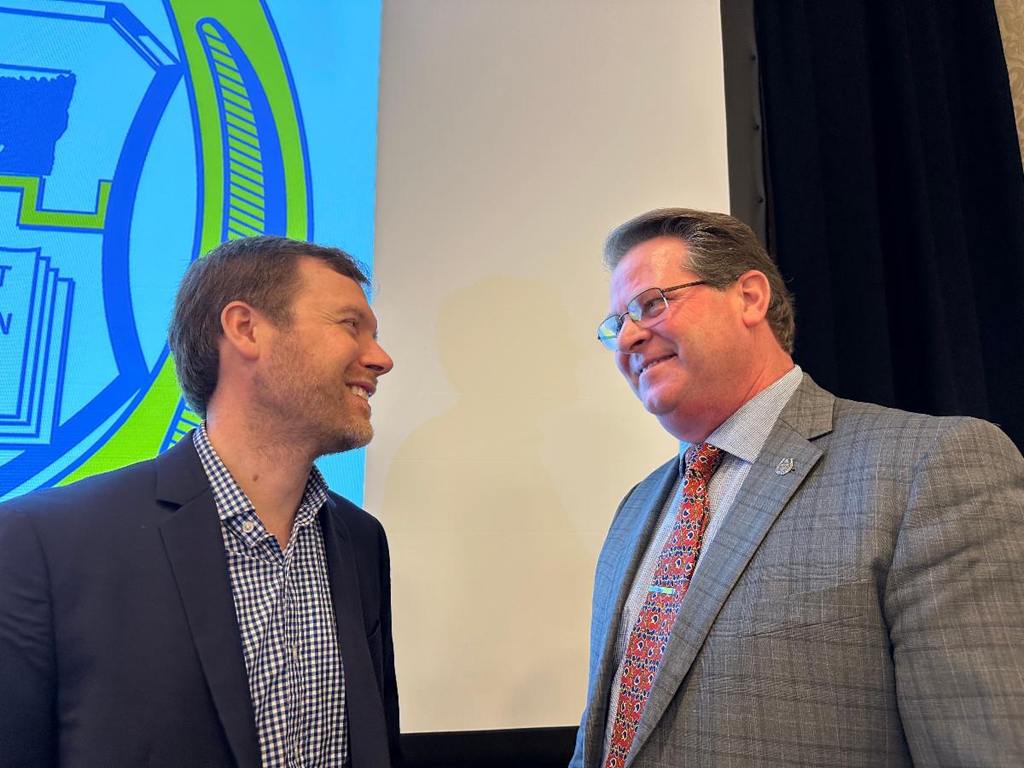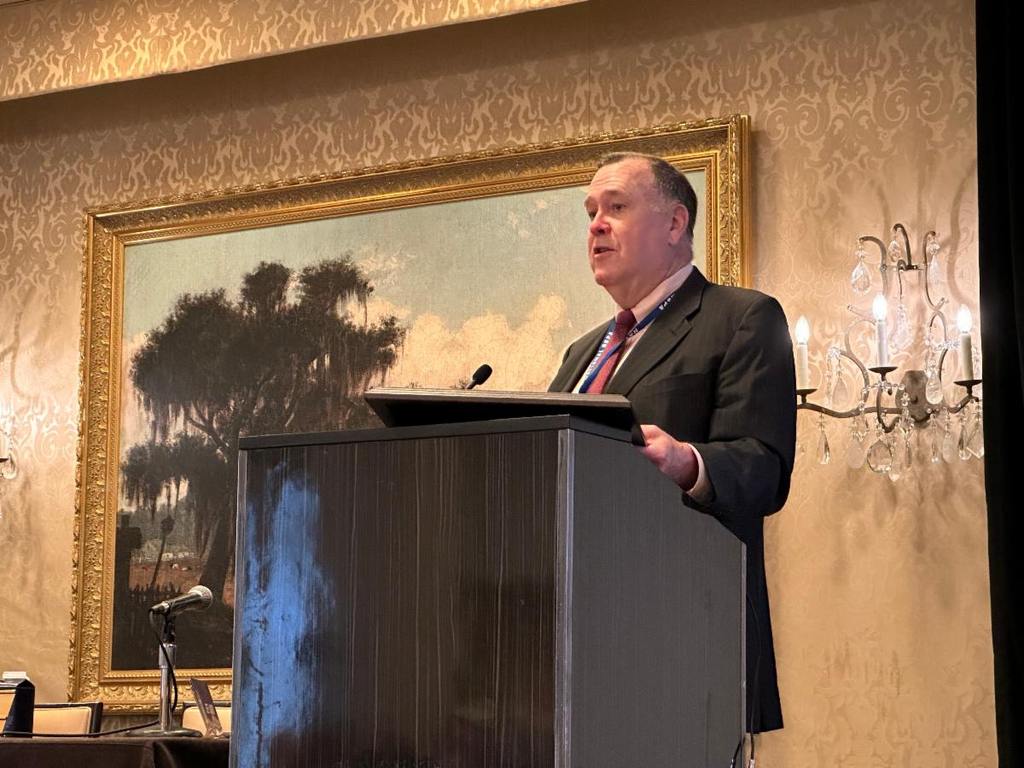
The panel on alternatives to HISA. (Denis Blake/National HBPA photo)
- Louisiana AG Landry: More than racing at stake
- More from Landry: ‘There’s a better option for us than this law’
- And this: ‘This law is paid for on the backs of you all’
- LJC attorney likes chances if HISA gets to Supreme Court
- Why HISA comparison to financial-services industry is flawed
- How future of Lasix could be determined by an opinion, not science
- ARCI’s Martin: 6th District ruling has downside for HISA proponents
(Just wait until FTC staff starts getting a bunch of clenbuterol positives) - Benefit of master cooperative agreements (think National Guard)
(‘Why are we inventing a whole new mechanism?’ asks Texas’ McNabb) - Hamelback: Pending litigation outcome, ‘we feel there is an answer’
NHBPA Press Release
NEW ORLEANS, La. — Louisiana Attorney General Jeff Landry and Daniel Suhr, managing attorney for the Liberty Justice Center, told an assembly of racehorse owners, trainers and racing regulators Tuesday that they expect the Horseracing Integrity & Safety Act (HISA) to wind up before the U.S. Supreme Court — and they also believe America’s highest court will strike down the legislation as unconstitutional.
While the room at the Hotel Monteleone was populated with folks concerned how HISA will impact their industry, Landry and Suhr said the four legal challenges before the Fifth and Sixth Circuits have much broader implications for the country. HISA, originally passed by Congress when slipped into the 2020 Covid relief bill, sets up a private corporation, also known as HISA or the Authority, with broad powers to create, implement and enforce safety rules and drug and medication policies with the Federal Trade Commission providing some measure of oversight.
Landry, who brought suit against HISA in U.S. District Court in the Western District of Louisiana, was the keynote speaker Tuesday on the first of three days of panel discussions and presentations at the National Horsemen’s Benevolent & Protective Association (NHBPA) conference being held in conjunction with the Association of Racing Commissioners International (ARCI), which represent pari-mutuel racing regulators.
“If we don’t get this thing struck down, you better have this meeting in probably the dining room – and I mean the small dining room here at the Monteleone,” Landry said. “It will be a bunch of folks who have more money in their pockets than they know what to do with. And they’re going to control the tracks and horse racing, and the rest of us really won’t be able to enjoy the sport… This law is actually designed to eliminate the very fabric of horse racing. And so, we stood up.
“I said, ‘We are going to keep filing suits, and we’re going to find a way to bring this thing to the U.S. Supreme Court if we have to. Guess what? We are there. And I’m glad we’re there. I know the Sixth Circuit decision (upholding HISA, in contrast to the Fifth Circuit’s appellate court ruling) was not all that great for us. But quite frankly, I think it was. Because it is going to absolutely force this case before the United States Supreme Court.
“This in my opinion, outside of horse racing, is actually one of the most important cases that will go before the Court this century. If this law is upheld, there is nothing that is out of reach of the federal government. There is no industry. There is no activity. There is nothing those boys in Washington can’t lay their hands on… I don’t believe horse racing is one size fits all. I’m not about to tell folks in Florida or New York or Kentucky how they should conduct their horse racing. And I don’t want them to come down to Louisiana and tell me how we should.
“… The fellows that are writing the (HISA) laws don’t even know how to shoe a horse, yet they want to regulate a horseshoe. Then to add insult to injury, this law is paid for on the backs of you all – those who labor the hardest and sometimes receive the least. The jockeys, trainers, vets, the owners. You paid for it. Uncle Sam says, ‘We like this law. You’ve got no opportunity to debate whether you think the provisions were right, wrong or indifferent. We signed this into law. We’re going to regulate you, and you’re going to pay for it.’ How do y’all like that?
“… This basically creates an opportunity for a handful of elite people to dictate the rules of the game. For those of you who have helped us and joined us, I want to say, ‘thank you.’ From where we started to where we are today is a much different place… I really do believe that we can affect a minimum of five of those justices on the Court…. I believe there’s a better option for us than this law. I’m going to tell you, when this is all over with, we’re going to give you a case and we’re going to give you a decision from the United States Supreme Court that is absolutely going to make you happy.”
‘What we’re fighting about is accountability, transparency and fairness’
The non-profit Liberty Justice Center is representing the National HBPA pro bono in what became the first challenge to HISA’s constitutionality filed in the Fifth Circuit, whose Court of Appeals ruled 3-0 in favor of the horsemen. Those judges remanded the case back to the lower District Court for reconsideration.

“I believe this case is important not just for this industry,” Suhr said. “I know it is. But I’m here because I believe it’s important for our country and our democracy, and I don’t say that lightly. Because fundamentally what we’re fighting about is accountability, transparency and fairness, which are core guarantees of our Constitution to all of us as citizens. When the government exercises power in our lives, when it comes into our business, our families, it is accountable to voters, it is transparent to the stakeholder community, to the news media and to all of us as citizens. And it is neutral. It is independent and it is fair when it exercises that power.”
Suhr said, based on their written SCOTUS opinions, that he believes there are enough justices to strike down HISA. “There’s no such thing as a slam dunk in my business,” he said. “It’s a lot like yours. Everything is a little bit of a gamble. But I do this for a living, and I can tell you, we brought this case because we believe when it gets to the Supreme Court, those fundamental principles we’ve been talking about are actually going to decide the day. I think we have a really great shot at this.”
Suhr said the Sixth District, in upholding HISA, got the application wrong but the principle right.
“‘… the government may not empower a private entity to exercise unchecked legislative or executive power,” he said, reading from the ruling. “Those who govern the people must be accountable to the people. Completely transferring unchecked federal power to a private entity that is not elected, removable or impeachable undercuts representative government at every turn.’
“… We’re not going to let the government pick individual parts of industries and give them power over the rest of the industry.”
The Authority has said repeatedly that it plans to start enforcing its Anti-Doping and Medication Control rules on March 27 if approved by the FTC. Suhr said should the FTC grant approval, the Liberty Justice Center is prepared to go to court immediately to seek emergency relief aand an injunction to bar enforcement of those rules.
Joining Suhr on a Tuesday morning panel updating the audience about the four court cases were attorneys John Duvieilh, Pete Sacopulos and National HBPA General Counsel Peter Ecabert, who all represent plaintiffs in the HISA cases.
Comparisons to financial-services industry are flawed, lawyer says
Suhr said proponents of HISA incorrectly compare having the Authority regulating horse racing to the Financial Industry Regulatory Authority (FINRA) regulating the financial-services industry under the Securities and Exchange Commission (SEC).
“You’ll hear this line, ‘Well we’re just doing for horse racing what Congress has already done for the financial-services industry, that there’s this self-regulatory industry organization and the SEC will oversee them and it’s the exact same model,’” he said. “It is not the exact same model.
“Everybody who is licensed by FINRA gets to vote as to who sits on the board. HISA, the Authority, is a self-perpetuating oligarchy. They pick themselves and they pick their successors. Does anybody in this room think if there were an open election … on who would sit on the board of HISA, that we’d have the same board we have today? Not going to happen. The second big difference is that if enough people didn’t like FINRA, the law allows them to set up their own alternative.”
Another difference, Suhr said, is that the SEC is composed of experts in that industry, which is not the case with the FTC and horse racing. “They’re just going to rubber-stamp it,” he said of the rules. “That’s very different from the SEC model, where you have truly independent, truly expert checks and balances on FINRA.”
Duvieilh — who represents the Louisiana HBPA, the Louisiana Racing Commission and others who joined Louisiana and West Virginia in Landry’s lawsuit — said of HISA: “There are some parts of it that are good. But the bad parts outweigh the good parts, so we have no choice but to pursue what we’re doing. Which hopefully someday will get us to the table. We have to get in there and have a voice. And if we don’t, we’re going to get run over.”
Alternatives to HISA: Compacts, master cooperative agreements
A Tuesday afternoon panel offered concepts that could lead to uniformity without vesting so much control and power in one entity and still utilizing the existing racing commissions.
“As we all look through a different lens now, something has to be established for uniformity,” said National HBPA CEO Eric Hamelback. “We want to make it constitutional, and we want to make sure the right participants are helping to make the decisions. I see it as the right participants are in this room…. We want uniformity based on science. We want it based on peer-reviewed research. We feel the way the (HISA) legislation was drafted, it doesn’t lean toward being based on science. I think there’s a lot of opinion in there.”
How future of Lasix could be determined by an opinion, not science
Complete text of Williams’ remarks
Mike Tanner, the executive vice president and CEO of the U.S. Trotting Association, provided a stark example of how a decision fundamentally changing the industry could be based on a personal whim and not science.
“We can see in the plain language of the HISA statute that the HISA Authority will prefer arbitrary authority to science in making its decisions,” Tanner read from remarks prepared by USTA President Russell Williams, who was unable to attend. “The study group is given three years to come up with a report that will include recommended changes, if any, to the 48-hour ban. The board of the HISA Authority may modify the ban based on the study report, but only by a unanimous vote. Section 3055(e)(3)(B) goes on to require that the unanimous vote must unanimously adopt the following findings: the modification is warranted, the modification is in the best interests of horse racing, furosemide has no performance enhancing effect on individual horses, and public confidence in the integrity and safety of racing would not be adversely affected by the modification.”
Williams’ remarks continued: “So HISA calls for a study conducted by a group that the HISA Authority puts together, with no requirement of scientific methods or validity. Even so, the study results can be invalidated by the opinion of any one member of the HISA Authority. No explanation is required for this opinion. Nothing, for example, could be more arbitrary than the opinion of one HISA Authority board member about public confidence in racing. It is simple authoritarianism, the opposite of accountability, that sets up a rigged and unscientific study and then, in case the study recommends an exception for furosemide, to provide for a unilateral veto on the basis of any one of four measures. This part of the HISA statute spells out in its own words that science will have no part to play in HISA regulatory decisions. Arbitrary opinion will rule, even if it is the opinion of a single board member.”
One alternative path forward is adopting an interstate compact, where states opt-in to agree to the same rules. Ecabert, the National HBPA’s General Counsel, said compacts are “basically a vehicle where states get together and agree to act cooperatively. It allows for responsive and quick resolution.”
Ed Martin, the President and CEO of the ARCI, said a compact could be a workable alternative “so as not to bankrupt an industry by replicating things already in place.
“… ARCI has proposed interstate compacts in the past as a way to avoid the federal government getting into something that has been handled by the states,” he said. “It’s welcome that the HBPA now has interest in this.”
Martin: ‘The Sixth Circuit pretty much diminished HISA (Authority)’
In the Sixth Circuit case’s recent ruling, the appellate court upholding the legality of HISA seemed satisfied that a two-sentence “fix” passed in late December as part of the must-pass omnibus bill addressed constitutional questions by giving more power to the Federal Trade Commission. However, Martin said that ruling comes with a downside for HISA supporters.
“The Sixth Circuit pretty much diminished HISA,” Martin said. “The (Sixth Circuit) court believed the regulator is the FTC. That ruling pretty much said that HISA enforcement action is not final. It’s the FTC that makes it final. The Federal Trade Commission all of a sudden getting a lot of clenbuterol positives is not something that is going to go over very well in the internal staff meetings. So that kind of weakens that whole adjudication, arbitration system that HISA hopes to create for themselves. The other thing I got out of reading that thing is that HISA is just advisory and if you don’t like a rule you can go directly to the FTC.
“… So, a lot changed with that decision. I’m not sure the people who originally were trying to create HISA expected that it would not be all-powerful. So now there’s a federal agency with no veterinarians, no experience in equine care and limited exposure to racing that supposedly is in total control.
“… There’s not a racing regulator who is not concerned about how this is going to play out… HISA is learning about how complicated and hard it is to regulate this sport. You can’t sit in an ivory tower and think you’ve got all the answers, because you don’t. Then when you go out and start implementing, you start affecting real-life people. And you start impacting on the economics of an industry that was fragile to begin with in many corners.
“They had a golden opportunity to get federal money to pay for (HISA) and mitigate the cost of it. We made a pitch to say, ‘If you’re going to want to do this, put some money in it. Because the cost of this is going to be prohibitive.’ Whomever lobbied Congress just ignored that, and subsequently should this stand, everyone will pay more.”
“This is not rocket science,” says Texas commission vice chair
Equine veterinarian Connie McNabb — who serves as vice chair of the Texas Racing Commission and who was a career military officer in the U.S. Air Force, Texas Air National Guard and elsewhere — said uniformity could be achieved using existing state structures through master cooperative agreements between federal agencies and states. In the case of the National Guard, the federal government provides funding and equipment to the states, which in turn must meet the same strict standards and a high level of accountability.
“Uniform national standards are also highly attainable by another mechanism,” McNabb said. “Our state statute specifically does not allow us to relinquish our responsibility and control over racing — even though we do agree that national standards, more integrity, all of that is very good. But state control and state sovereignty is not on the table, and doesn’t have to be.
“… Why are we inventing a whole new mechanism, when something has been very well road-tested? … This is not rocket science. It does not have to be an independent group that, as the lawyers put out there, very well might be trampling on our rights under the Constitution.”
“Do we want a higher quality of racing? Do we want greater integrity? You bet. Can we do everything that they’re doing to the same standards with the budget we currently have? No. But we are more than willing and excited to meet that level. But it’s all about resources. And we’ll be as accountable as anybody. If you don’t live up to it, there are consequences, if you do, press on. This does not have to be the creation of a new authority that happens in the dark of night.”
Hamelback: ‘We feel as if it’s an answer everybody will appreciate’
Hamelback, the National HBPA CEO, concluded the session saying there are several Congressmen, “bipartisan and bicameral, that are very interested in a repeal of HISA. But they also are just as interested in moving something forward that is driven from the ground up, utilizing the state commission infrastructure.
“Basically, what we are considering is an example of the federal interstate compact. The suggestion is a board of directors made up of nine individuals, five of them set by the states that have the most racing dates. It doesn’t matter what breed. The members of the compact would then elect the other four.
“From there we’ve also suggested emphatically that there be three scientific advisory committees — one for each major racing breed — and a fourth committee, a safety committee. Looking at some of the same sort of structures that we’ve seen with HISA, we think there is a model there. We have recommended that there be funding from the government, funneled through the United States Department of Agriculture and they be involved with equine research…. The ultimate enforcement, we feel like it still comes from the racing commissions and the structure we have now. We don’t have to reinvent the wheel.”
Meanwhile, litigation continues.
“While people look at us and say, ‘What are you going to do next?’ Ultimately it depends on what happens with the litigation,” Hamelback said. “So, for us, we feel as if there’s something there. We feel there is an answer. We feel as if it’s an answer everybody will appreciate because all of the participants in the industry will be involved.”






